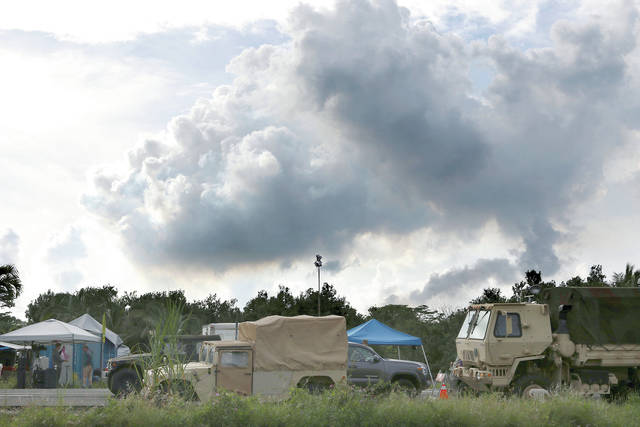The man tabbed by Gov. David Ige to command a task force comprised of National Guard and active-duty military in case the Kilauea volcano lava crisis becomes too much for civilian authorities said Wednesday that planning is underway in the event a large-scale response becomes necessary.
“Some of the missions we’re anticipating are search and rescue, emergency evacuation, debris clearance (and) security,” said Brig. Gen. Kenneth S. Hara, appointed by Ige to lead Joint Task Force 50. “… We currently have about 19 personnel that will assist me in planning for projected missions. The (active duty) forces will only be apportioned to the Joint Task Force 50 if there’s a mission assignment that’s given to the (task force) that the National Guard forces cannot provide.”
The request to form the task force and Hara’s appointment were approved Wednesday by Secretary of Defense James Mattis.
Hara said there are 133 National Guard personnel providing assistance to the county during the state of emergency declared May 3.
According to Hara, who is the state deputy adjutant general and commander of the Hawaii Army National Guard, the task force would only be deployed in response to a county request. If the need can be provided through the National Guard, it will be vetted through the Hawaii Emergency Management Agency. Any request that requires active-duty troops also would have to go through vetting by the Federal Emergency Management Agency.
“All of that takes time, having the appropriate structure to plan and be able to respond should we get a mission assignment. If I don’t have the personnel in place, we won’t be responsive,” Hara said. “… My whole point is trying to be responsive to the needs of the county because we are in support of the county government.”
Hara described the situation with the lava, which has destroyed 37 structures in lower Puna and caused mandatory evacuations of Leilani Estates and Lanipuna Gardens subdivisions, as “very dynamic and constantly changing.”
“There are days that there are lulls and it looks like, hey, the fissures aren’t showing up, not a lot of seismic activity. Then the following day, a new fissure breaks out and a huge eruption is … threatening Highway 137,” he said. “… What’s challenging for us is what’s going to be the population that we need to evacuate by air. As long as the roads are open and there’s a voluntary evacuation, we’re working with the county to see what the numbers are going to be. So unless there’s something catastrophic (with) no notice, we’re thinking we may not even need aviation support.”
Hara described a worst-case scenario as one where the three state highways in lower Puna, Highways 130, 132 and 137, are all severed by lava. Hara estimated that about 1,000 people might have to be airlifted if such an event occurs. He also said such a response would have to be made with one of the National Guard’s key resources used during the recent Kauai flooding.
“Our CH-47 Chinook helicopters are currently mobilized and training in Texas getting ready for deployment to Kuwait, so that’s a huge capability and capacity of … helicopter support that we no longer have in the National Guard, to augment our UH-60 Black Hawks. We feel if we do a huge air evacuation, we might need the resources of the active duty, not just of the Army, but the United States Marine Corps,” Hara said, referring to the Marine air station in Kaneohe, Oahu.
Hara said there also are about 1,200 Army soldiers at Pohakuloa Training Area on the Big Island plus nine UH-60 Black Hawk helicopters.
A 22-person Joint Task Force advance team has been in Hilo since Monday, according to a written statement by the governor’s office.
“Pre-staging the advance team will enable faster response to requests for military support made by Hawaii County,” the statement said.
Email John Burnett at jburnett@hawaiitribune-herald.com.




